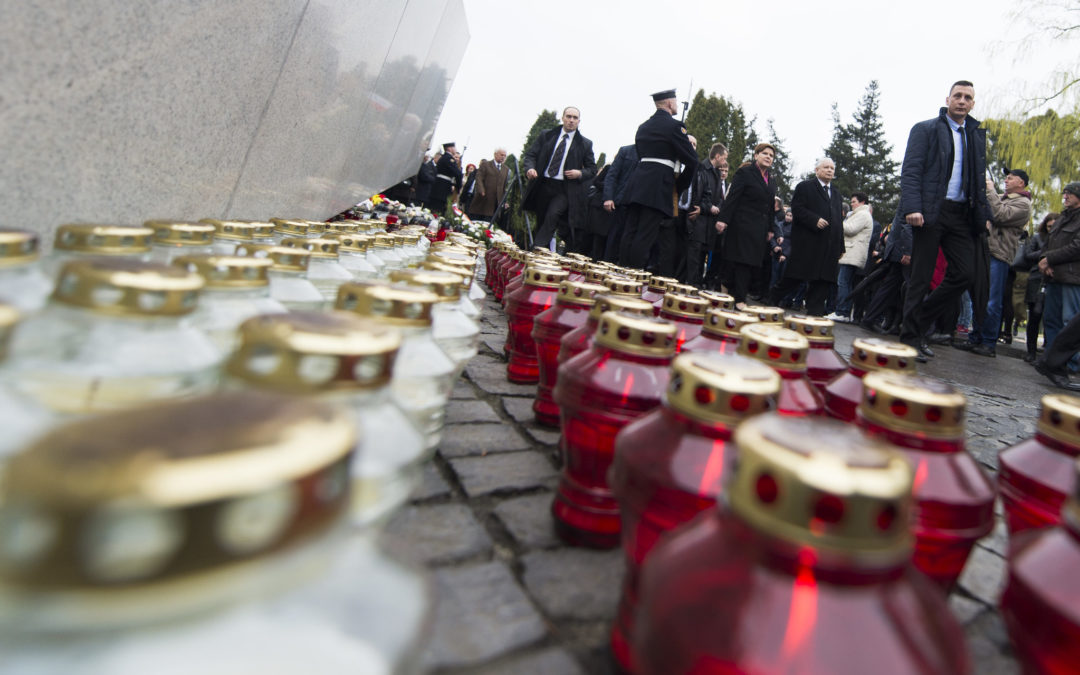Russia’s foreign ministry has declared its willingness to work with Poland to organise commemorative events this April to mark the 80th anniversary of the Katyn massacre and the 10th anniversary of the Smolensk air disaster. Both issues have caused tension between the two countries.
Earlier this month, the Polish embassy in Moscow made a request to the Russian ministry asking for its support in organising a Polish state visit to Smolensk to commemorate the anniversaries, reports Onet, a news website.
Among those hoping to attend is Prime Minister Mateusz Morawiecki, who announced that he “wants to pay homage to the victims of the terrible Soviet murder in the Katyn forest and of the Smolensk disaster”. A member of President Andrzej Duda’s election campaign team, however, expressed concern that, if Duda attended, there could be an attempt by the Russians to “humiliate the president [with] some kind of provocation.”
The Katyn massacre occurred in April and May 1940, when the Soviets systematically murdered around 22,000 Polish military officers and members of the intelligentsia who had been captured following the invasion and occupation of Poland by Nazi Germany and the Soviet Union in 1939.
The mass graves were discovered in 1943, but for decades the Soviets denied responsibility. Only in 1990 did they acknowledge their guilt.
Prosecutors in Russia ordered plaques honouring Polish victims of the Katyn massacre to be removed, saying they were "not based on documented facts".
It is "a small part of an expanding effort to rewrite dark pages of Russia’s past", writes @mjluxmoore https://t.co/3ZI1zFDI5t
— Notes from Poland ?? (@notesfrompoland) December 30, 2019
In 2010, further tragedy struck when a plane carrying then president Lech Kaczyński and 95 others to a commemoration of the massacre crashed while attempting to land at Smolensk, the nearest city to Katyn forest. All passengers on board were killed.
Polish and Russian official investigations both found the crash to have been an accident. But many in Poland’s now ruling Law and Justice (PiS) party – including its leader and Lech Kaczynski’s twin brother, Jarosław – claimed there had been a cover-up, suggesting that the crash could even have been caused deliberately. Yet despite extensive investigations during its five years in power, PiS has not presented evidence to convincingly contradict official accounts.
Last week, the PiS politician in charge of the main investigation, Antoni Macierewicz, promised that further findings would be revealed around the anniversary of the crash in April. This would include details of how the official investigations were “falsified” and how “Russian secret services” were involved in maintenance of the aircraft. But previous similar promises have not resulted in any conclusive new evidence.
The issue remains a cause of some tension with Russia. Warsaw has in particular criticised Moscow for its continued refusal to return the wreckage of the plane to Poland (which the Parliamentary Assembly of the Council of Europe has twice called on Russia to do).
In a statement to Polish journalists this week, however, the Russian foreign ministry expressed surprise that anyone in Poland might think they would be reluctant to assist with a commemoration. The ministry “confirms its readiness to help in organising the visit”, it wrote, quoted by Onet.
In response, the head of the Polish prime minister’s chancellery, Michał Dworczyk, confirmed that they were “conducting dialogue” with Russia to “analyse possibilities” for organising the event.
While the prime minister has expressed his willingness to attend, President Andrzej Duda has appeared more reluctant. Earlier this month, his spokesman refused to confirm whether Duda aimed to travel to Smolensk, saying only that he wanted to commemorate the tragedies “in a dignified manner”.
This week, Radosław Fogiel, part of Duda’s campaign team, told Gazeta.pl that “the president wants to attend to honour the memory of the victims”. But “a big role in the decision will be played by an assessment of the likelihood of the Russians trying to humiliate the president [with] some kind of provocation”.
Fogiel also noted the recent “attacks by Vladimir Putin on Poland, the attempt to assign responsibility to us of World War Two”. This was a reference to another area of ongoing tension between the two countries, following the Russian president’s repeated statements in December seeking to blame Poland for the war and suggest that its prewar ambassador to Germany was an antisemite who sympathised with Hitler.
The diplomatic crisis led eventually to President Duda boycotting the World Holocaust Forum in Israel last month, after his request to speak was refused but Putin was made one of the keynote speakers. The host of the event, Israeli Holocaust memorial Yad Vashem, later apologised for allowing “inaccuracies and distortions” at the forum.
Earlier this month, Russia’s ambassador to Warsaw declared that “relations with Poland are at their worst since the end of World War Two”. He blamed the Polish side, which was trying to “rewrite history, guided by the desire to weaken Russia’s position”, reported RMF24.
That prompted a curt response from Polish diplomats in Moscow, who told Onet that, however bad relations may be at the moment, they are better than at the end of the war, because now “there are no Soviet troops on Polish territory”. They said that the reason for the recent problems has been the fact that Russia is “modelling itself on Soviet politics”.
Main image credit: P. Tracz/KPRM/Flickr (under public domain)

Daniel Tilles is editor-in-chief of Notes from Poland. He has written on Polish affairs for a wide range of publications, including Foreign Policy, POLITICO Europe, EUobserver and Dziennik Gazeta Prawna.




















